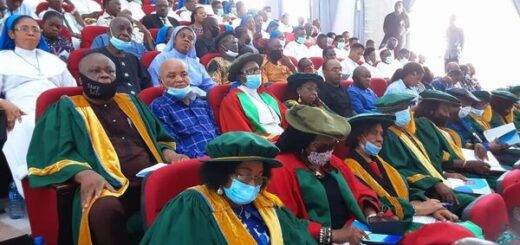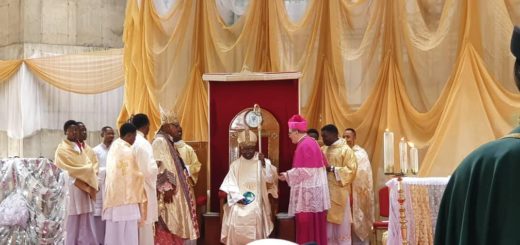PAN AFRICAN CONGRESS ON MISSIOLOGY
PAN AFRICAN CONGRESS ON MISSIOLOGY, AT DOMUS FIDEI, IKEJA, LAGOS, 25th to 29th OCTOBER, 2016. AN OPENING ADDRESS BY MOST REV. IGNATIUS A. KAIGAMA, PRESIDENT, CATHOLIC BISHOPS’ CONFERENCE OF NIGERIA, PRESIDENT, REGIONAL EPISCOPAL CONFERENCE OF WEST AFRICA AND ARCHBISHOP OF JOS
On behalf of the Catholic Bishops’ Conference of Nigeria and the Regional Episcopal Conference of West Africa, I welcome all of you to this PAN AFRICAN CONGRESS ON MISSIOLOGY. The theme: Ad Gentes: Fruits of Mission in Africa, hope for the Future, is appropriate in the context of our world today. Books on Church History are filled with chapters of how different countries of Africa were evangelized by Missionaries from Europe and America. Today, the Church in Africa is sending out missionaries to the countries that once evangelized the mission territories in Africa. This fruit of mission has made Africans evangelized evangelizers. Given that dialogue should go along with evangelization, the Catholic Bishops’ Conference of Nigeria (CBCN) created the department of Mission and Dialogue in the Catholic Secretariat of Nigeria (CSN). It is this Department that requested that the CBCN should approve the creation of the “Catholic Missiologists’ Association of Nigeria” (CAMISAN) to work with other Catholic Missiologists at the global level. The CBCN welcomed this request and approved it without hesitation.
The Department of Mission and Dialogue in collaboration with the Pontifical Mission Societies (PMS) are the main missionary organs of the CBCN. CAMISAN is a brain child of our mission unit to encourage reflections and to discuss contemporary mission theology. For more enlightenment and adequate preparation for mission, the department of Mission and Dialogue organizes mission orientation courses for the Nigerian Priests and Sisters who are being sent out on mission. When they return, a re-immersion program is organized for them. After each orientation course, the Bishop in the diocese where the orientation takes place perform a “missioning ceremony” whereby the missionaries are officially sent out on behalf of the Church in Nigeria with a certificate that reminds the missionaries that they are being sent by the Church in Nigeria.
The implication of the CBCN missioning the Nigerian missionaries is to remind them that wherever they are sent, they should strive to represent Christ and the Church that sent them well and to present a good image of where they are coming from. It may interest you to note that the department of Mission and Dialogue has the statistics of the Nigerian missionaries all over the world. This department goes further to visit the missionaries, when opportunities present themselves. Some Nigerian missionaries in countries like Ivory Coast, Burkina Faso, Mali and towns such as London, Atlanta, Houston and New York have been visited so far. It is hoped that this encounter will become more formal and regular.
The “Pan African Congress of Missiology” is being hosted for the first time in Nigeria this week, October 25-29, 2016. This is an appreciation of the fact that the Church in Africa has become a missioning Church. Pope Francis said that “every land is a missionary land” when he received in audience participants in the General Chapter of the Missionary Oblates of Mary Immaculate. It is true that today, there are still many areas that have not received the gospel message of Jesus Christ.These are areas that have souls to be “harvested for the kingdom of God”. According to Pope Francis, “Today,” “every land is ‘mission land,’ every dimension of the human is mission land, which awaits the proclamation of the Gospel.”
Today, there are many people who are baptised but have become lapsed in the faith. These people need to be re-evangelized through words and missionary witness of life. Many Christians in Africa today live among Muslims, adherents of African Primal Religions and people of other religions. We need to reach these people with the message of the gospel if not for conversion but at least for the purpose of living in peace and harmony with them.
In 1991, Francis Cardinal Arinze (then President of the Pontifical Council for Inter-religious Dialogue (PCID) and Jozef Cardinal Tomko (Prefect of the Congregation for the Evangelization of peoples) presented to the world a document titled: DIALOGUE AND PROCLAMATION. This document responded to the following questions:
- Is missionary work among non-Christians still relevant?
- Has it not been replaced by Interreligious dialogue?
- Does not respect for conscience and freedom exclude all efforts at conversion?
- Is it not possible to attain salvation in any religion?
- Why then should there be missionary activity?
This document defines dialogue as mutual communication with an attitude of respect and friendship. Proclamation is the communication of the gospel message. These are authentic expressions of the Church’s mission to all nations and individuals. “Dialogue and proclamation are thus both viewed, each in its own place, as component elements and authentic forms of one evangelizing mission of the Church. They are both oriented towards the communication of salvific truth”. The conversion that dialogue seeks is not from one religion to the other but a conversion to justice and peace in the world. The Church through proclamation imposes nothing. She respects individuals and cultures and she honours the sanctuary of conscience.
The situation of the world today imposes on all preachers the obligation to adopt a new style of evangelization that makes dialogue indispensable. The human mind has become so critical that the only argument that can convince the world today is witness of life because “actions speak louder than words”. To be a good preacher today, it is important that one’s way of life must be like the Holy Scripture that people can read. In other words, let your actions show what you believe. This will be more effective than all the noise pollution with loud speakers all over the houses of worship without consideration for the next door neighbour who perhaps wants to enjoy some peace and quiet. What the world desperately needs today are not smooth talkers, grandiloquent or flamboyant Church personalities but pragmatic witnesses.
To be good missionaries in our world today, education is imperative. Here, I sincerely thank the Pontifical Urban University, Rome for assisting in the sponsorship of this Congress. The same sentiments of gratitude are extended to MISSIO Germany. The involvement of the Symposium of Episcopal Conferences of Africa and Madagascar (SECAM) and the Regional Episcopal Conference of West Africa (RECOWA) deserves our gratitude too. Your contributions are deeply appreciated.
The mission of evangelization today calls for dynamic forms. We need to move with the signs of the times hence the use of all forms of media to proclaim the gospel is relevant for today’s world whereby more attention be paid to religion in many of the schools in Africa. In some countries, for fear of proselytizing, the civil government has taken over schools from the Church. In Nigeria, while some State Governments have returned schools to their original owners, others do not see the need. This is destroying the standard of education and morals among the young ones. There could be no meaningful evangelization in an environment where the children are ignorant in the concerns of God and religious values.
In conclusion, I wish to state that our mission becomes real when we can see the people around us not merely as neighbours but our neighbours’ keepers. On June 1, 2012, at the National Christian Centre, Abuja, on the occasion of the National Catholic Prayer pilgrimage for Nigeria, I asked: How do you know that it is “day break”? You know that it is dawn when you can look at a neighbour’s eyes and see a brother or a sister in his or her eyes. As long as you cannot see your neighbour as a brother or sister, you are still in the dark. Mission and dialogue can help us to forgive, reconcile and heal wounded memories.
Once again, I thank you the organisers and sponsors of this Congress. I thank the Archdiocese of Lagos for welcoming us. It is my prayer that the fruits of this Congress will renew the life of our people in Africa and the whole world.
God bless this Pan African Congress on Missiology. May God bless richly all the participants.
On this note, I humbly and respectfully declare this Congress open.




